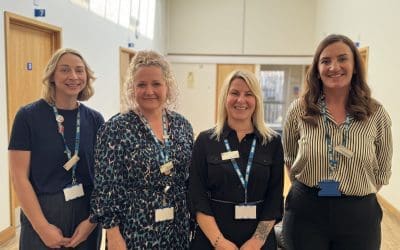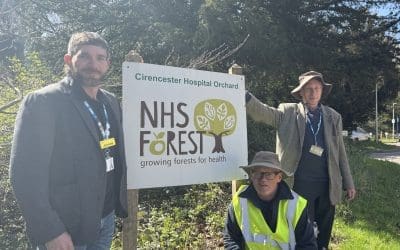With the number of reported measles cases in young people in the UK on the rise, the School Age Immunisation Team at Gloucestershire Health and Care NHS Foundation Trust is urging parents and guardians of children in Years 8 to 11 (aged 12 to 16) to check their MMR status and make sure they are fully vaccinated against the disease.
Measles is around five times more infectious than Covid-19, spreads very easily, and you can catch it at any age. Most people will have mild disease, however, babies and young children, pregnant women and those with a weakened immune system are at increased risk of complications, including pneumonia, meningitis, blindness, seizures and pregnancy loss.
The best way to protect your child against measles is to ensure they are fully vaccinated. The MMR vaccine is a safe and effective combined vaccine that protects against measles, mumps and rubella (German measles).
Young children should be offered the MMR vaccine as part of the UK national vaccination programme. They will be offered two doses of the vaccine – the first one just after their first birthday and the second dose before they start school (usually at around three years and four months of age).
To see if your child is up to date with their MMR vaccines, check their Personal Child Health Record (PCHR), known as the red book, or contact your GP practice.
If you have a child at secondary school (Year 8-Year 11) and they have never previously received the MMR vaccine, have only had one dose of it, or you’re not sure of their vaccination status, our School Age Immunisation Team can check your child’s record and arrange to give them their outstanding doses if needed.
Why are measles cases rising?
The World Health Organisation (WHO) says there was an “alarming” 30-fold increase in measles cases across Europe in 2023. More than 30,000 people were infected, compared to 941 during the whole of 2022.
The number of young primary school children who have had both doses of the MMR vaccine is below WHO targets. Approximately 85% of children in 2022-23 had received two MMR doses by their fifth birthday, the lowest level since 2010-11. The recommended figure is 95%.
In some cities, such as Liverpool, Manchester, Birmingham and Nottingham, only 75% of five-year-olds are fully vaccinated, NHS figures show. This means more than 3.4 million children in England aged under 16 are unprotected.
Child health experts say some parents underestimated the seriousness of measles because it had largely been eradicated. In addition, many routine health appointments were missed during the Covid pandemic.
There are also still people who wrongly believe the MMR jab is linked to autism. Some young adults who are not vaccinated today missed out when they were children because those fears were prevalent among new parents at the time.
About the MMR vaccine
The combined MMR vaccine has been safely protecting children in many countries worldwide. In the UK, millions of doses have been given since it was introduced in 1988.
The vaccine is very good at providing protection against measles, mumps and rubella. More than 99 per cent of those who have two doses of the vaccine will be protected against measles and rubella. Although mumps protection is slightly lower, cases in vaccinated people are much less severe.
Before vaccines can be used, they have to be thoroughly tested for safety. Although there may be some side effects, they are usually mild and much less severe than the disease itself – serious reactions following vaccination are rare. Many studies have taken place to look at the safety and effectiveness of the MMR vaccine. The evidence is clear that there is no link between the vaccine and autism.
Get in touch
To contact the School Age Immunisation Team call 0300 421 8140 or email MMR.Immunisation@ghc.nhs.uk
To find out more about the MMR vaccine visit: MMR (measles, mumps and rubella) vaccine – NHS (www.nhs.uk)
Our School Age Immunisation Service
It is important to protect our children and young people against dangerous infectious diseases. The National Immunisation Programme means that diseases like Polio have disappeared in the UK. This is only possible by maintaining the high vaccination rates for children and young people across our local communities.
Our School Age Immunisation Service provides immunisations to all school-age children, including those that are home educated and in special education schools. These include:
- Human Papilloma Virus (HPV)
- Diphtheria, Tetanus and Polio (Td/IPV)
- Meningitis ACWY (MenACWY)
- influenza (flu)
- MMR for children in Years 8-11 who have never previously had the vaccines, or only had one dose.
We also offer the BCG (tuberculosis) vaccination for those children and young people that meet the World Health Organisation (WHO) criteria.
Sessions take place in schools and community venues to help ensure all children have access to the service.
For further information about school-age immunisations and our immunisation team, visit: School-aged Immunisation Team > CYPS Glos Health & Care NHS (ghc.nhs.uk)




